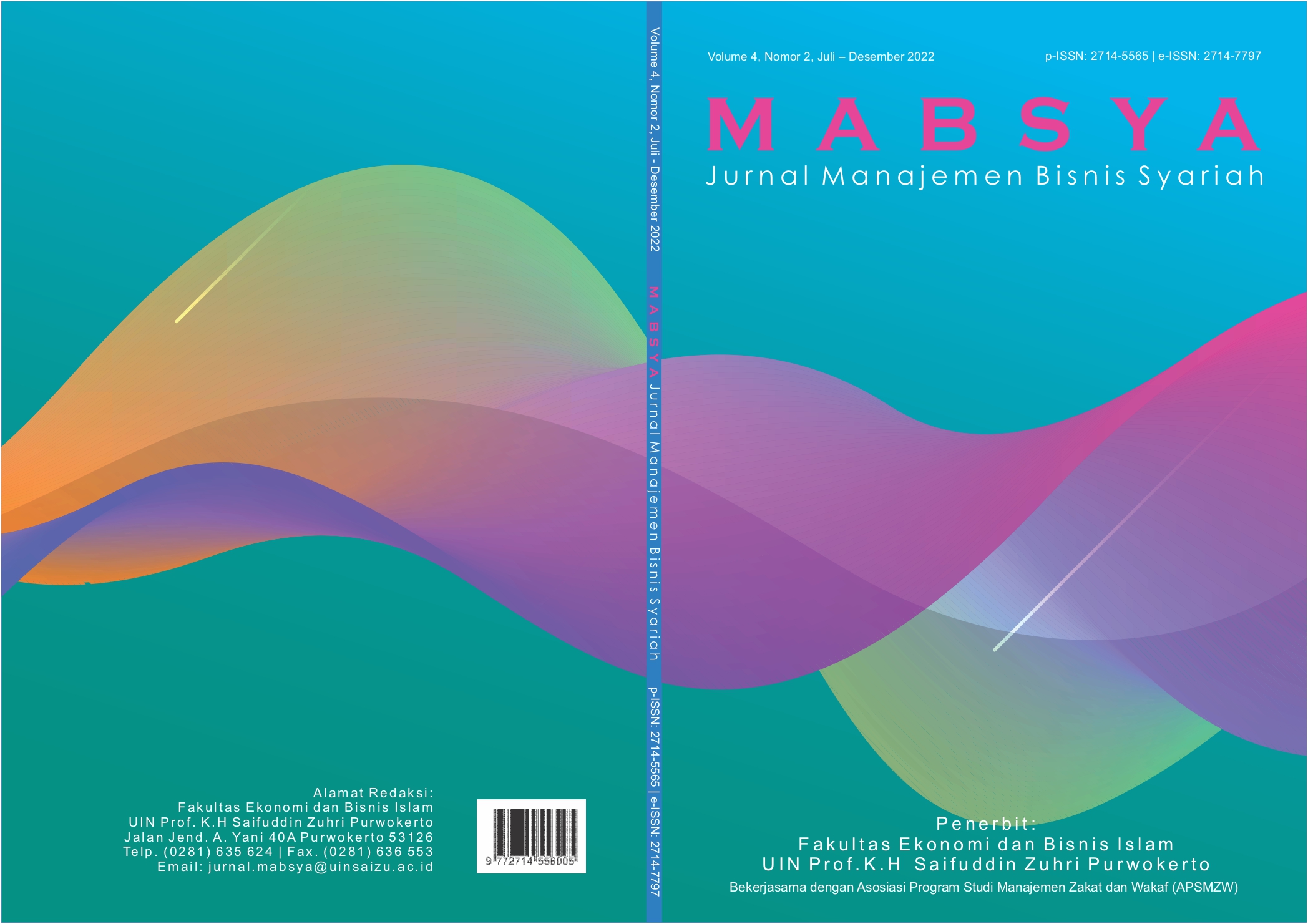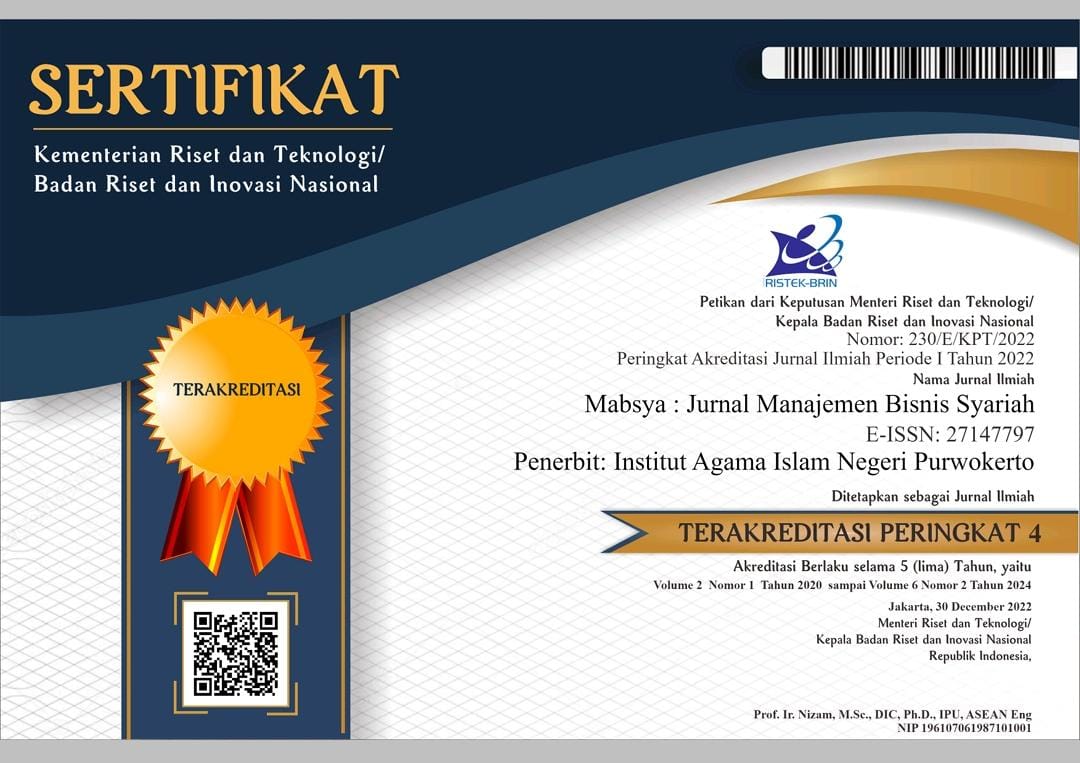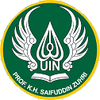The Potential of UIN Prof. KH. Saifuddin Zuhri in the Development of the Halal Industry in Purbalingga Regency
DOI:
https://doi.org/10.24090/mabsya.v5i2.9477Keywords:
Purbalingga, Halal Industry, UIN Prof. KH. Saifuddin ZuhriAbstract
This paper aims to reveal the regional orientation of Purbalingga district, Central Java. In terms of the urgency of the presence of tertiary institutions, in order to strengthen the halal industry, The research uncovers the meta-potential of resources involving regional planning, socio-economic, religious, regulatory, and educational volumes. This research is based on observational qualitative research with an administrative data approach and field research. As a result, it was found that the development of the halal industry in Purbalingga district was relatively new. With the initiation of the presence of a number of supporting government institutions, both in the field of religion and strengthening business actors. With the industrialization policy, the presence of relevant tertiary institutions is increasingly needed to be it. In this case, it is necessary to ratify halal industry regulations to accommodate the implementation of the development and strengthening of the halal industry. Local governments must accelerate the halal industry by strengthening programs for all elements of society, academics and religious leaders. The implementation of Islamic Higher Education in the development of the halal industry in Purbalingga Regency must get a priority in an effort to build development and human indexes in addition to strengthening industrial areas.References
Abu Bakar, R. (2021). Pengantar Metodologi Penelitian. SUKA-Press UIN Sunan Kalijaga.
Adeoye-Olatunde, O. A., & Olenik, N. L. (2021). Research and scholarly methods: Semi-structured interviews. JACCP: Journal Of The American College Of Clinical Pharmacy, 4(10), 1358–1367. https://doi.org/10.1002/jac5.1441 DOI: https://doi.org/10.1002/jac5.1441
Ajayi, V. O. (2017). Primary sources of data and secondary sources of data. Benue State University, 1(1), 1–6.
Althusius, A. A., Herwangi, Y., & Sarwadi, A. (2018). Keterkaitan RPJMDes Terhadap RPJMD Kabupaten. Unej E-Proceeding, 514–523.
Awaluddin, M. (2018). Penguatan Peran Perguruan Tinggi Islam Dalam Mendorong Pengembangan Lembaga Keuangan Syariah di Indonesia. Jurnal Iqtisaduna, 4(2), 238–249. DOI: https://doi.org/10.24252/iqtisaduna.v4i2.6970
Badan Pusat Statistik Kabupaten Purbalingga. (n.d.). Retrieved 20 August 2023, from https://purbalinggakab.bps.go.id/statictable/2017/05/19/125/-metode-baru-indeks-pembangunan-manusia-dan-komponen-pembentuknya-di-kabupaten-purbalingga-2010-2022.html
Budoyo, S. (2018). Peranan Perguruan Tinggi Dalam Mengatasi Problematika Hukum Di Indonesia. Jurnal Meta-Yuridis, 1(1). DOI: https://doi.org/10.26877/m-y.v1i1.2864
Bungin, B., & Moleong, L. J. A. (2007). Jenis dan Pendekatan Penelitian. Proses Kerja Kbl Dalam Menjalankan Program Corporate Social Responsibility Di PT. Pelindo 1 (Persero) Cabang Pekanbaru Untuk, 33.
Dinkominfo, P. (2022). Pembagian Wilayah Administrasi [dataset]. https://www.purbalinggakab.go.id/info/pembagian-wilayah-administrasi/
Duryat, H. M., & Alphan, M. P. (2021). Pendidikan Dan Perubahan Sosial:(Telaah Konseptual Pemikiran Pendidikan Mansour Fakih). K-Media.
Effendi, M. R. (2022). Best Practice Outcomes Based Education Islamic Religious Education Curricullum; Implementation and Challenges in Higher Education Tri Dharma Activities. ICoIS: International Conference on Islamic Studies, 3(2), 480–484.
Harding, S. F. (2018). Convicted by the Holy Spirit: The rhetoric of fundamental Baptist conversion. In Across the Boundaries of Belief (pp. 381–401). Routledge. DOI: https://doi.org/10.4324/9780429502569-26
Herusatoto, H. B. (2008). Banyumas; Sejarah, Budaya, Bahasa, Dan Watak. LKIS Pelangi Aksara.
Hilyatin, D. L., Riyadi, S., & Basit, A. (2021). Transformation of Islamic Values in the Pancasila Economic System. Turkish Online Journal of Qualitative Inquiry, 12(3). https://tojqi.net/index.php/journal/article/view/1741/1471
Hindarto, T. (2020). Bukan kota tanpa masa lalu: Dinamika sosial ekonomi kebumen era Arung Binang VII. Deepublish.
Hox, J. J., & Boeije, H. R. (2005). Data collection, primary versus secondary. DOI: https://doi.org/10.1016/B0-12-369398-5/00041-4
Indonesia, B. (2022). Kajian Ekonomi dan Keuangan Syariah 2022. Kementerian Keuangan RI. https://www.bi.go.id/id/publikasi/laporan/Documents/KEKSI_2022.pdf
Ismanto, K. (2022). The Role of Islamic Universities in the Development of the Halal Industry Case Study in Central Java Province of Indonesia. Proceeding International Conference on Islam and Education (ICONIE), 2(1), 955–970.
Kurniasih, R., & Wahyudin, W. (2022). MSME Resilience Levels in Banyumas and Purbalingga District, an Empirical Study After the Pandemic. Sustainable Competitive Advantage (SCA), 12(1).
Misanam, M. (2008). Handbook Mata Kuliah Metode Penelitian. Raja Grafindo Persada.
Moleong, L. (2005). Metodologi Penelitian Kuantitatif. Remaja Rosdakarya.
Muhtar, M., & Amarullah, R. (2018). Sebuah Paradoks: Opini WTP dan Kesejahteraan Rakyat. Jurnal Borneo Administrator, 14(2), 135–150. DOI: https://doi.org/10.24258/jba.v14i2.335
Nasrullah, A. (2018). Analisis Potensi Industri Halal Bagi Pelaku Usaha Di Indonesia. At-Tahdzib: Jurnal Studi Islam Dan Muamalah, 6(1), 50–78.
Nurhayati, & Hendar. (2018). Personal Intrinsic Religiosity and Product Knowledge on Halal Product Purchase Intention. Journal of Islamic Marketing, 11(3), 603–620. https://doi.org/10.1108/JIMA-11-2018-0220 DOI: https://doi.org/10.1108/JIMA-11-2018-0220
Pandey, P., & Pandey, M. M. (2021). Research methodology tools and techniques. Bridge Center.
Pelantikan Pengurus DPP IAEI Periode 2019-2023. (n.d.). Retrieved 20 August 2023, from https://www.iaei-pusat.org/news/siaran-pers/pelantikan-pengurus-dpp-iaei-periode-2019-2023-ketua-iaei-pengembangan-ekonomi-islam-menjadi-bagian-dari-program-pemerintah?language=id
Priambodo, A. (2022). Kontribusi Tingkat Kemiskinan Terhadap Pendapatan Asli Daerah Di Kabupaten Purbalingga. Perwira Journal of Economics & Business, 2(1), 65–71. DOI: https://doi.org/10.54199/pjeb.v2i1.78
Pujayanti, D. A. (2020). Industri Halal Sebagai Paradigma Bagi Sustainable Development Goals Di Era Revolusi Industri 4.0. Youth & Islamic Economic Journal, 1(01), 20–33.
Revandi, V., Ernawati, A., & Wibowo, A. N. (2019). Pengaruh Bandar Udara Terhadap Urban Development Di Purbalingga. Seminar Nasional Komunitas Dan Kota Berkelanjutan, 1(1), 34–37.
Riyadi, S., & Akhmadi, S. (2022). Pemberdayaan Masyarakat Pondok Pesantren Berbasis Pengembangan Lembaga Keuangan Mikro Syariah: Studi Kasus pada Pondok Pesantren Darussalam Dukuhwaluh Kabupaten Banyumas. El-Jizya: Jurnal Ekonomi Islam, 10(1), 51–66. DOI: https://doi.org/10.24090/ej.v10i1.6371
Santoso, L., & Cahyani, Y. T. (2020). Pengaturan wisata halal untuk pembangunan daerah: Transformasi industri halal di era disrupsi. Supremasi Hukum: Jurnal Kajian Ilmu Hukum, 9(1), 57–75. DOI: https://doi.org/10.14421/sh.v9i1.2130
Setkab RI, S. R. (2019, April 16). Resmikan Halal Park, Presiden Jokowi Targetkan 5 Juta Kunjungan Wisata Halal ke Indonesia. Sekretariat Kabinet Republik Indonesia. https://setkab.go.id/resmikan-halal-park-presiden-jokowi-targetkan-5-juta-kunjungan-wisata-halal-ke-indonesia/
Suharsimi, A. (2006). Prosedur Penelitian Suatu Pendekatan Praktik (Vol. 134).
Taylor, S. J., Bogdan, R., & DeVault, M. (2015). Introduction to qualitative research methods: A guidebook and resource. John Wiley & Sons. DOI: https://doi.org/10.1002/9781394260485
Triguswinri, K. (2021). Halal Industry in Indonesia Muslim Middle Class Consumption Behavior: An Analysis of New Institutionalism. Journal of Research in Business, Economics, and Education, 3(5), 87–93.
Tumangkeng, S. (2018). Analisis potensi ekonomi di sektor dan sub sektor pertanian, kehutanan dan perikanan kota Tomohon. Jurnal Berkala Ilmiah Efisiensi, 18(01).
Umar, H. (2007). Metodologi Penelitian Bisnis. Gramedia Pustaka Utama.
Usman, H., & Akbar, P. S. (2009). Metodologi Penelitian Sosial (5th ed.). Bumi Aksara.
Winarni, E., Ahmad, A. A., & Suharno, S. (2021). Community participation of development planning in Purbalingga Regency. ICORE, 5(1).
Downloads
Published
How to Cite
Issue
Section
License
Copyright (c) 2023 Sugeng Riyadi

This work is licensed under a Creative Commons Attribution 4.0 International License.
Authors who publish with this journal agree to the following terms: Authors retain copyright and grant the journal right of first publication with the work simultaneously licensed under a Creative Commons Attribution 4.0 International License that allows others to share the work with an acknowledgment of the work's authorship and initial publication in this journal.














